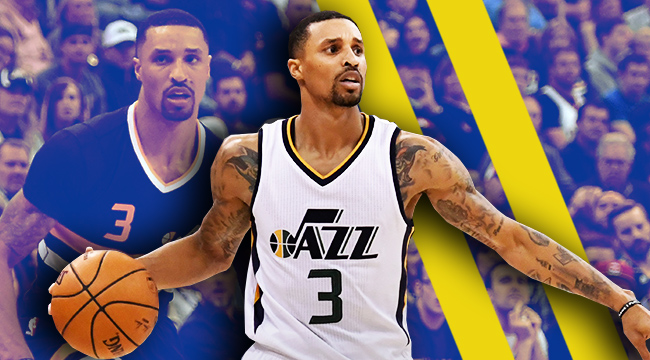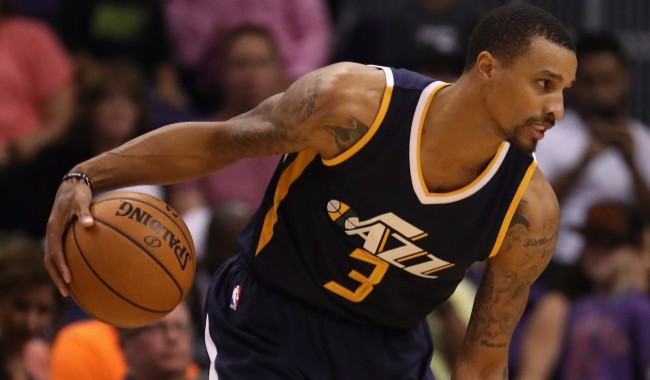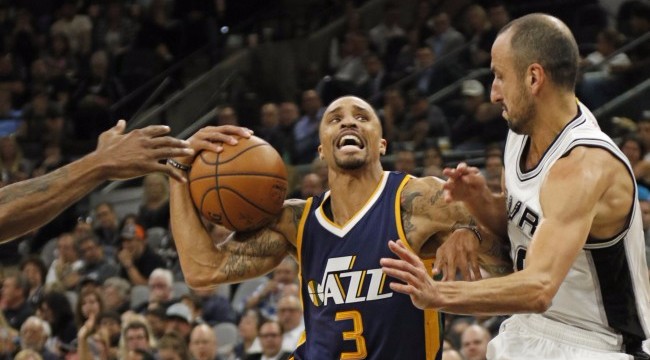
The Utah Jazz were supposed to be good in 2016-2017. For the most part, they’ve been just that. Despite various injuries that include the use of their best five-man unit for only 12 minutes through more than six weeks of the season, the Jazz remain afloat with a 15-10 record. And credit should be handed out across the board.
Quin Snyder’s coaching performance in the early going has been tremendous, as he’s been forced to mix and match his lineups on a nightly basis depending on which of his upper-tier players is unavailable. Beyond that, the sheer presence of big man Rudy Gobert – who happens to be a legitimate Defensive Player of the Year candidate – for the entire body of work is wildly important. The Jazz lean on his talents heavily on both ends of the floor. Finally, it certainly helps that general manager Dennis Lindsey constructed what is arguably the deepest roster in the NBA, putting together a group that can sustain through injuries in a way that most teams in the league simply could not.
Lindsey’s crowning achievement when it comes to the 2016-2017 season is the acquisition of point guard George Hill, who happens to be the most indispensable player on the roster. Yes, you are reading that right. George Hill is the most indispensable player on a basketball team that includes the likes of Gordon Hayward, Derrick Favors, and the aforementioned Gobert.
Heading into the 2016 offseason, it was no secret that the Jazz needed help at the point guard position. Lottery pick Dante Exum missed the entire 2015-2016 campaign with injury, and while Utah added Shelvin Mack midseason to stop the bleeding, the team’s biggest issue was a lack of production from arguably the most important position on the floor. Furthermore, the Jazz posted a 40-42 record despite a positive (+1.6) net rating, and that could be directly traced to disastrous performance in the clutch.
Utah was outscored by a ghastly 17.8 points per 100 possessions across 42 “clutch”-including games during the season and it is not hard to correlate inept closing play to a lack of direction at point guard.

Enter Lindsey, who swooped in as a part of a three-team trade involving Jeff Teague, Utah’s first round pick, and Hill to immediately improve the team’s roster in a sharp way. Though Hill has appeared in only 11 games this season, it is easy to see why the upgrade was desired by the team’s front office. In those 11 contests, the Jazz own a sparkling 8-3 record and Utah has been utterly spectacular with Hill on the floor.
In 360 minutes of action, Hill’s steady hand has led the Jazz to outscore opponents by 14.3 points per 100 possessions, which would easily serve as the widest margin in the entire league over a full season. Utah’s offense has been remarkably efficient (112.9 points per 100) with Hill at the helm and, on the defensive end, the long-armed point guard helps to transform the unit from very good to absolutely elite with his unique and wide-ranging talents.
Skeptics would point to the fact that Hill is playing unsustainably well and, frankly, that sentiment could have an element of truth. The 30-year-old boasts career best marks in scoring (20.4 points per game), three-point shooting (45.6 percent) and overall efficiency (24.9 PER), but simply chalking that up as early-season fortune would also be a mistake.
One of the brilliant instances of foresight in the mind of the front office was to find potentially the only player in the NBA with Hill’s individual skill set. He is more than capable of running an offense as a facilitator, but Hill also serves as an above-average floor-spacer (career 37.9 percent from beyond the arc) that does not need the ball in his hands to be successful on the offensive end. That plays directly into the hands of a team that already has a lot of creation on the wing with the likes of Hayward and Rodney Hood, and the fit has been seamless.

On the defensive end, the same logic applies. Hill serves as the long, active defender at the point of attack that the organization undoubtedly prioritized with the drafting of Exum, and his size (6’3 with a 6’9 wingspan) also allows Utah to switch liberally in order to take advantage of their overall team quickness. Without throwing additional shade in the direction of Mack, Raul Neto, and Trey Burke, the difference between the production of a year ago and what Hill can bring is unimaginably stark.
The Jazz were projected by many as a 50-win team this season and that, at least to some extent, has to do with Hill and the overall upgrade at the position. While keeping him healthy and on the court (Utah is just 7-7 without him) is vitally important, the team must also make a decision on his future given the fact that the point guard will hit the open market as an unrestricted free agent in July.
It is far too early to fret about the mechanics of that in mid-December, but in the present, Utah’s upside is on the level of any non-Warriors entity in the Western Conference. Getting the pieces on the floor together for an extended period of time will be paramount.
George Hill isn’t the best player on the Utah Jazz roster, and that isn’t a slight to a player that is being compared to the likes of Rudy Gobert and Gordon Hayward for that honor. However, the soon-to-be free agent is the linchpin of a team with legitimate Conference Finals aspirations. If he can simply sustain 90 percent of the level achieved in the early going, the Jazz aren’t crazy for having very big dreams in the near future.






